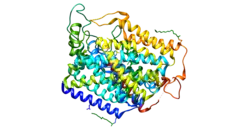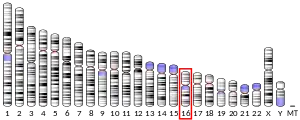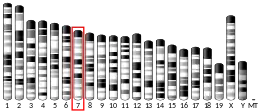钠-葡萄糖协同转运蛋白2
钠-葡萄糖协同转运蛋白2(英語:,SGLT2)又称又称钠-葡萄糖耦联转运体2[7]、钠糖转运子2[8],是由SLC5A2[9](溶質載體家族5成員2)基因編碼的蛋白質[10]。
| 钠-葡萄糖协同转运蛋白2 | |||||||||||||||||||||||||
|---|---|---|---|---|---|---|---|---|---|---|---|---|---|---|---|---|---|---|---|---|---|---|---|---|---|
 | |||||||||||||||||||||||||
| |||||||||||||||||||||||||
| 識別號 | |||||||||||||||||||||||||
| 别名 | SLC5A2;, SGLT2, solute carrier family 5 member 2 | ||||||||||||||||||||||||
| 外部ID | OMIM:182381 MGI:2181411 HomoloGene:2289 GeneCards:SLC5A2 | ||||||||||||||||||||||||
| 相關疾病 | |||||||||||||||||||||||||
| renal glycosuria[1] | |||||||||||||||||||||||||
| 為以下藥物的標靶 | |||||||||||||||||||||||||
| 卡納格列淨、达格列净、恩格列淨、sergliflozin etabonate[2] | |||||||||||||||||||||||||
| |||||||||||||||||||||||||
| |||||||||||||||||||||||||
| 直系同源 | |||||||||||||||||||||||||
| 物種 | 人類 | 小鼠 | |||||||||||||||||||||||
| Entrez | |||||||||||||||||||||||||
| Ensembl | |||||||||||||||||||||||||
| UniProt | |||||||||||||||||||||||||
| mRNA序列 | |||||||||||||||||||||||||
| 蛋白序列 | |||||||||||||||||||||||||
| 基因位置(UCSC) | Chr 16: 31.48 – 31.49 Mb | Chr 7: 127.86 – 127.87 Mb | |||||||||||||||||||||||
| PubMed查找 | [5] | [6] | |||||||||||||||||||||||
| 維基數據 | |||||||||||||||||||||||||
功能
SGLT2屬於鈉依賴型葡萄糖共同運輸蛋白,是和鈉濃度有關的葡萄糖共同運輸蛋白。SGLT2是腎臟內主要协同转运蛋白葡萄糖重吸收的主要协同转运蛋白[11]。
大部份SGLT2都是位於近端腎小管細胞中S1段和S2段的刷狀薄膜,負責將腎臟中90%的葡萄糖重新吸收,繼而促進葡萄糖穿過腎臟細胞,再吸收到血液中[12][13]。
作用
對健康人士而言,幾乎所有已過濾的葡萄糖都會被SGLTs重新吸收到近端腎小管 (約90%被SGLT2吸收,其餘10%被SGLT1吸收),然後返回到血液中。當血糖低於某一水平(即是腎糖水平),腎臟會吸收葡萄糖,因此尿液中幾乎不會含有糖份[14][12]。
SGLT2和二型糖尿病
至於糖尿病患者,其血糖水平已超過一般的腎糖水平,令葡萄糖必須通過尿液排出體外[14]。在二型糖尿病患者體內, SGLT2有可能過於活躍,導致腎臟重新吸收過多葡萄糖[15][16]。
抑制SGLT2
抑制SGLT2可減少近端腎小管重新吸收葡萄糖至血液的份量,增加尿糖排泄量、熱量流失和滲透性利尿。因此,抑制SGLT2對血糖、體重和血壓,均有改善作用[17][18][19][20]。
抑制SGLT2在糖尿病及相關管理中的重要角色
要妥善管理2型糖尿病,是相當複雜及具挑戰性的。雖然2型糖尿病患者可使用各種治療方法降低血糖,但不少個案採用了這些方法後,仍未必能達致理想的血糖目標。至於療效未如理想的成因,多是因為在治療過程中,出現了副作用,如體重增加、低血糖和胃腸道不適等,因而拖延了治療進度[21]。
钠-葡萄糖协同转运蛋白2抑制剂(SGLT2抑制劑)能直接針對葡萄糖,且毋需依賴β細胞功能和胰島素抗性機制[22][23]。
目前,醫學界正就SGLT2抑制劑的抑制機制進行臨床研究,期望找出此機制對控制糖尿病患者的血糖、體重、血壓、β細胞功能和胰島素抵抗程度等的成效。此外,醫學界亦正在研究SGLT2抑制劑導致低血糖症、尿道和生殖器感染的風險。
醫學界期望,SGLT2抑製劑可成為治療2型糖尿病(T2D)的另一個重要臨床方案。
認識抑製SGLT2的研發過程 [24]
- 早於在1835年,根皮苷複合物是由法國化學家發現可從蘋果樹的根皮中分離出來,後來被研製成SGLT1抑製劑和SGLT2抑製劑。
- 動物研究顯示,根皮苷能誘導尿糖排泄,使空腹血糖持續正常水平,和避免餐後高血糖症。
- SGLT2抑製劑的效用則與根皮苷相類似,但抑製劑已被合成為更有效和更選擇性針對SGLT2,因此治療效果會更為顯著。
參考資料
- .
- .
- GRCh38: Ensembl release 89: ENSG00000140675 - Ensembl, May 2017
- GRCm38: Ensembl release 89: ENSMUSG00000030781 - Ensembl, May 2017
- . National Center for Biotechnology Information, U.S. National Library of Medicine.
- . National Center for Biotechnology Information, U.S. National Library of Medicine.
- https://www.termonline.cn/search?searchText=SGLT
- 徐鲁斌,田东丽,陈丽萌.钠糖转运子2抑制剂在糖尿病肾病管球反馈调节中的作用[J].中华肾脏病杂志, 2018, 34(6):5.DOI:10.3760/cma.j.issn.1001-7097.2018.06.015.
- https://www.genenames.org/data/gene-symbol-report/#!/hgnc_id/HGNC:11037
- Wells RG, Mohandas TK, Hediger MA. . Genomics. Sep 1993, 17 (3): 787–9. PMID 8244402. doi:10.1006/geno.1993.1411.
- . (原始内容存档于2019-07-01).
- Bays H. From victim to ally: the kidney as an emerging target for the treatment of diabetes mellitus. Curr Med Res Opin. 2009; 25(3):671-81.
- Gerich JE. Role of the kidney in normal glucose homeostasis and in the hyperglycaemia of diabetes mellitus: therapeutic implications; Diabetic Med. 2010;27:136–142
- Abdul-Ghani et al. SGLT2 inhibition and Type 2 Diabetes. Endocrine Reviews, August 2011, 32(4):515–531 7. Bays H. From victim to ally: the kidney as an emerging target for the treatment of diabetes mellitus. Curr Med Res Opin. 2009; 25(3):671-81.
- Gerich JE. Role of the kidney in normal glucose homeostasis and in the hyperglycaemia of diabetes mellitus: therapeutic implications; Diabetic Med. 2010;27:136–142
- Rahmoune et.al. Glucose transporters in human renal proximal tubular cells isolated from the urine of patients with non–insulin-dependent diabetes; Diabetes, Vol. 54, December 2005: 3427-34
- Rosenstock J, et al. Dose-ranging effects of canagliflozin, a sodium-glucose cotransporter 2 inhibitor, as add-on to metformin in subjects with Type 2 Diabetes. Diabetes Care. 2012.
- List JF, et al. Sodium-glucose cotransport inhibition with dapagliflozin in Type 2 Diabetes. Diabetes Care 2009; 32:650-7.
- Wilding JPH, et al. A study of dapagliflozin in patients with Type 2 Diabetes receiving high doses of insulin plus insulin sensitizers. Diabetes Care. 2009; 32:1656-62.
- Zhang L, et al. Dapagliflozin treatment in patients with different stages of type 2 diabetes mellitus: effects on glycaemic control and body weight. Diabetes, Obesity and Metabolism. 2010; 12:510-6.
- Nair, S. and Wilding, J. P. H. Sodium Glucose Cotransporter 2 Inhibitors as a New Treatment for Diabetes Mellitus. J Clin Endocrinol Metab. 2010. 95(1):34–42.
- Abdul-Ghani MA, DeFronzo RA. Inhibition of renal glucose reabsorption: A novel strategy for achieving glucose control in type 2 diabetes mellitus. Endocrine Practice. 2008;14:782-90
- Idris I, Donnelly R. Sodium-glucose co-transporter-2 inhibitors: an emerging new class of oral antidiabetic drug. Diabetes Obes Metab. 2009 Feb; 11(2):79-88.
- Ehrenkranz, J. R. L. et al. Phlorizin: a review. Diabetes Metab Res Rev. 2005; 21: 31–38.



